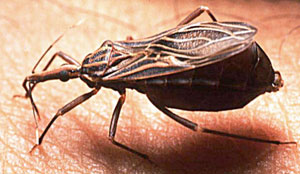Update on Chagas Disease
BY ALLISON KOZICHAROW; EDITED BY BERNICE BORN
 Triatominae, also called the kissing bug. It's considered
Triatominae, also called the kissing bug. It's considered
most responsible for transmitting Chagas.
Chagas disease made the news recently when a New York Times article revealed a plan by Turing Pharmaceuticals CEO Martin Shkreli to charge from $60,000 to $100,000 for a course of benznidazole to treat Chagas disease, up from the current price of $5 to $100 for a two-month course of the drug.
“It’s caused a lot of angst in the Chagas community,” said Dr. Sheba Meymandi, a professor at the University of California, Los Angeles, and director of a Chagas treatment center at Olive View-UCLA Medical Center. “Everyone’s in an uproar.”
Chagas, also called American trypanosomiasis, is a parasitic disease which occurs mainly in rural poverty-stricken areas in South America, but which has spread lately to other continents. Of the estimated 7 million people who have Chagas disease, approximately 300,000 live in the United States.

Resources

Chagas disease is spread mainly by insects, but it can also be contracted in other ways such as through blood transfusion. The illness is not transmitted from person to person like a cold or the flu or through casual contact with infected people or animals. Although there is no vaccine for Chagas disease, it can be cured if caught in its early stages. If untreated, it can lead to life-threatening cardiac and gastrointestinal conditions. In areas where the disease is endemic such as in Latin America, prevention relies on improving housing and spraying insecticides inside housing to eliminate bugs. In the United States, control strategies focus on preventing the illness from spreading during blood transfusion, organ transplantation or childbirth.
WiRED International offers a Chagas Disease module for healthcare professionals. It describes the infection process, its symptoms, diagnosis and treatment and explains ways to prevent and control the disease’s spread.





